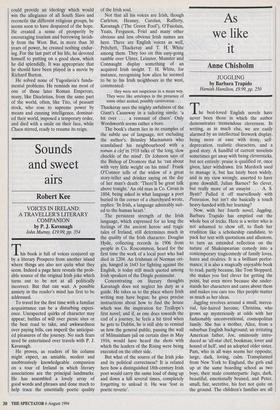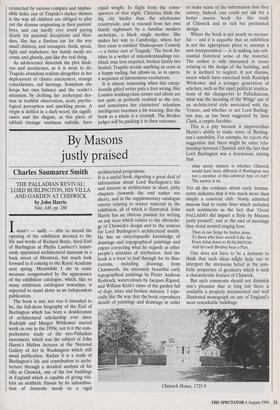As we like it
Anne Chisholm
JUGGLING The best-loved English novels have never been those in which the author demonstrates tremendous cleverness. In writing, as in much else, we are easily alarmed by an intellectual firework display, being more at ease with irony, self- deprecation, realistic characters, and a good story. A handful of current novelists sometimes get away with being cleversticks, but not entirely: praise is qualified or, once given, later withdrawn. Iris Murdoch used to manage it, but has lately been widely, and in my view wrongly, asserted to have gone downhill. Julian Barnes? So clever, but really more of an essayist . . . A. S. Byatt? Pulled it off marvellously with Possession, but isn't she basically a touch heavy-handed with her learning?
Now, with her fourth novel, Juggling, Barbara Trapido has emptied out the whole box of tricks. Here is a writer who is not ashamed to show off, to flash her erudition like a scholarship candidate, to pack her text with quotations and allusions, to turn an extended reflection on the nature of Shakespearian comedy into a contemporary tragicomedy of family loves, hates and rivalries. It is a brilliant perfor- mance; it is also a magically enjoyable book to read, partly because, like Tom Stoppard, she makes you feel clever for getting the point, but even more because she under- stands her characters and cares about them and makes you care too. Her people matter as much as her ideas.
Juggling revolves around a small, mercu- rial, fair-haired heroine, Christina, who grows up mysteriously at odds with her fashionably unconventional, cosmopolitan family. She has a mother, Alice, from a suburban English background; an irritating American father, Joe, ominously intro- duced as 'all-star chef, bookman, lover and hound of hell', and an adopted older sister, Pam, who in all ways seems her opposite; large, dark, loving, calm. Transplanted from New York to England, the girls end up at the same boarding school as two boys, their male counterparts: Jago, dark, beautiful, emotionally bruised, and Peter, small, fair, secretive, his feet not quite on the ground. The children's families are all connected by various complex and implau- sible links; one of Trapido's darker themes is the way all children are obliged to play out the dramas originating in their parents' lives, and can hardly ever avoid paying dearly for parental deceptions and blun- ders. She has a flawless ear for the way small children, and teenagers, think, speak, fight and misbehave; her family meals are comic and ghastly, just like the real thing.
As adolescence descends the plot thick- ens and accelerates, as it is wont to do; Trapido abandons realism altogether in her deployment of chance encounters, strange coincidences, red herrings. Somehow she keeps her own balance and the reader's attention, by clothing her archetypal dra- mas in truthful observation, acute psycho- logical perception and sparkling prose. A virgin is defiled in a dark wood; the signifi- cance and the disgust, as this piece of tabloid teenage nastiness unfolds, have equal weight. In flight from the conse- quences of that night, Christina finds the big city kinder than the wholesome countryside, and is rescued from her own family nightmare by a familiar modern archetype, a black single mother. She makes her way to Cambridge, where her first essay is entitled 'Shakespeare Comedy — a better sort of Tragedy.' The book fin- ishes in a welter of misunderstandings rec- tified, true love requited, broken family ties healed; Trapido avoids anything as crass as a happy ending, but allows us, as in opera, a sequence of harmonious resolutions.
It is almost reassuring when this excep- tionally gifted writer puts a foot wrong. Her London working-class scenes and idiom are not quite as perfectly realised as the rest, and sometimes her characters' relentless intelligence becomes a bit wearing. But the book as a whole is a triumph. The Booker judges will be packing it in their suitcases.



















































 Previous page
Previous page